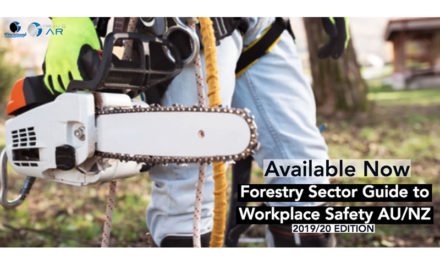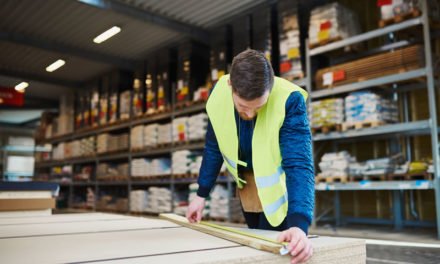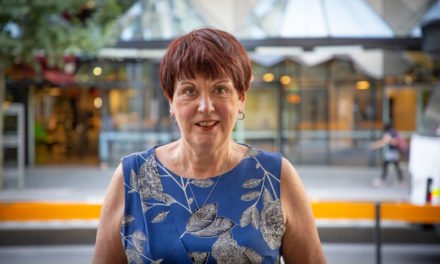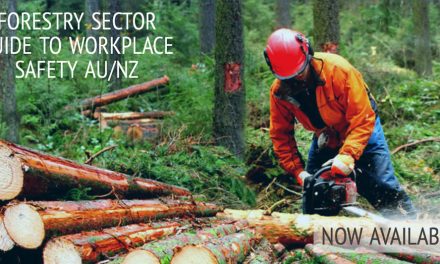With a focus on practical and worker-focused initiatives for the timber sector, TABMA’s new GM for training explains what’s on offer for keeping your staff safe. By Louise Kinloch
We all want to keep our staff safe, improve productivity and reduce injury in the workplace. But workplace health and safety isn’t as simple as that, there are so many things to consider and government regulations to follow. TABMA’s services have a focus and have been developed to help assist industry with WHS. We offer short courses and formal qualifications, we have a WHS division to offer advice and help you understand your obligations and as the industry’s biggest employer of trainees and apprentices our group training organisation understands that looking after young people’s safety in the workplace may take a little extra care.
TRAINING IN THE WORKPLACE
TABMA Training focuses on quality training outcomes that lead to career pathways for our learners and a skilled and capable workforce for our industry customers across Australia.
Workplace health and safety training is essential in every organisation, no matter how big or small. As a business owner or employer, you’re responsible for maintaining your workers are accurately trained on how to do their jobs safely.
Through training your employees in WHS, everyone can have a better understanding of how their work environment is set up as well as their WHS responsibilities while at work. With this knowledge, workers will feel more responsible in performing their duties and take any safety precautions that will help them avoid accidents while at work. Furthermore, WHS training assists with creating a safer, better place to work, reduces stress levels and empowers workers to feel safe and comfortable in their place of work. When workers know their employer cares and wants to protect their safety, they feel happier and more valued.
TABMA training can provide both accredited and non-accredited WHS training to your business. We can offer tailored training solutions to meet the Workplace Health and Safety needs of your business. TABMA training delivery methods include face to face, facilitated online or a blended delivery model.
For more information on how TABMA Training can assist your business please email us at info@tabmatraining.edu.au or call us on 1800 822 621
TABMA WHS – WOOD DUST
From our WHS officer’s travels around Australia, he has noted that the relevant State WHS Regulators are taking a closer look at wood dust.
Wood dust and formaldehyde are classified as Group 1 carcinogens by the International Agency for Research on Cancer (IARC). When wood products are worked on, dust and formaldehyde are released into the air. Prolonged exposure and inhalation of these products may cause cancer of the nasal cavity, sinuses and nasopharynx, as well as leukaemia. It is estimated that around 16% of cancers of the nose and nasal sinuses in men and 2% in women could be due to exposure to wood dust.
Wood dust exposure is highest amongst woodworking machine operators, cabinet makers, furniture finishers, carpenters and workers employed in the manufacture of wood products. You may be exposed to wood dust and formaldehyde if your work involves cutting, sawing, routing, turning, sanding or milling wood, EWP or pressed wood products.
Our WHS Officer, Dean Wilson has put together a few tips to help assist you.
- Ensure your employees are wearing correct PPE. Depending on your processes, different control measures will need to be implemented to reflect the wood dust produced.
- Good housekeeping. Keeping the workplace clean and tidy is a control measure to reduce dust in the workplace. Avoid using compressed air and sweeping, as this can disturb the dust. Where possible, use a filtered vacuum.
- Ensure that equipment that generates dust has sufficient extraction systems and where possible, conduct all wood processing in a well-ventilated area.
- If you are unsure if your levels of dust are safe or not, you can have your workplace air quality monitored.
If you would like more information on wood dust or anything WHS, please contact Dean at dean.w@tabma.com.au
LOOKING AFTER YOUNG PEOPLE’S SAFELY AT WORK
As a host or direct employer of young people, you must remember that young workers have no or limited work experience and so can often be at increased risk of workplace injuries.
While employees must take safety seriously as a part of their employment obligations, incidents can occur when they are rushing, distracted or haven’t been inducted. It is the employer’s responsibility to ensure their workforce is safe.
There were 120,355 serious workers’ compensation claims in Australia in 2019-20. Employers who don’t regularly review their procedures and keep up to date with Safe Work Australia recommendations and legislation are at high risk of staff injuries.
Of those 120,355 claims in 2019-20, 31% were for illness and diseases. Of these, mental health conditions were the most common. It is important to have regular catch-ups with employees to check in on their safety and wellbeing.
Young people are at risk of injuring themselves in the workplace, as they are still learning what it means to be safe at work and how to identify hazards. They may need reminders why they need to wear PPE and on the importance of inductions especially when working with machinery and equipment.
Regular safety talks are an excellent way to remind young workers as sometimes it will take some time for them to fully understand what it means to be safe in the workplace and how to follow procedures. Please remember young people need supervision and feedback when performing tasks on the job.
To discuss the issues around apprentices and trainees further, or if you’re considering adding a young person – or more than one – to your workplace, please contact TABMA on 1800 822 621 for further information.











